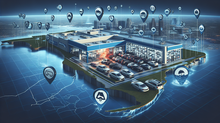Safeguarding Your Garage-Owned Vehicles: A Comprehensive Guide to Liability Protection
- Brian Reilly
- Dec 27, 2024
- 3 min read
In today's fast-paced world, many opt to store vehicles in rented garages, finding it practical for safeguarding investments. Yet, the responsibility of protecting these garage-owned vehicles from liabilities often goes overlooked. This article explores essential steps like securing physical damage insurance, implementing security measures, and maintaining a proactive approach to ensure comprehensive protection against unforeseen liabilities.
The Importance of Physical Damage Insurance
In a world where time is of the essence, storing vehicles in rented garages has become a popular choice for many. This option not only provides a convenient solution for those with limited space but also serves as a safeguard for valuable investments. However, while the practicality of garage storage is undeniable, the responsibility of protecting these garage-owned vehicles from potential liabilities often goes overlooked. An essential first step in ensuring your vehicle's safety is securing physical damage insurance. This type of insurance is crucial as it covers your vehicle against risks such as theft, vandalism, and natural disasters. Physical damage insurance provides a safety net, offering financial protection in the event of unforeseen incidents. It ensures that, regardless of the situation, you are not left shouldering the entire financial burden. By investing in this insurance, you are taking a proactive step in safeguarding your vehicle, providing peace of mind knowing that your investment is protected.
Enhancing Garage Security Measures
Beyond insurance, implementing robust security measures within the garage is vital. Security cameras are a great deterrent for potential thieves and vandals, as the presence of surveillance can significantly reduce the likelihood of an incident. Motion detectors add another layer of security, alerting you to any unexpected activity in or around the garage. Additionally, installing robust locks on all entry points can further deter unauthorized access. These security measures not only protect your vehicle but also enhance the overall safety of the garage environment. Regularly inspecting your garage for potential hazards is another crucial step. Leaks, electrical issues, or structural weaknesses can pose significant risks to your vehicle. Addressing these issues promptly can prevent costly damage and ensure your vehicle remains in optimal condition. Communication with the garage owner is also key. Ensuring the facility is well-maintained and secure is a shared responsibility, and fostering a cooperative relationship with the property owner can lead to better outcomes for both parties.
Maintaining a Proactive Approach
Taking a proactive approach to vehicle protection is essential. Creating a detailed inventory of your vehicle's condition and storing it in a safe place offers an additional layer of liability protection. This documentation can be invaluable in the event of a dispute or claim, providing clear evidence of your vehicle's state before any incident. It is also advisable to keep records of all security measures and inspections conducted. These records can serve as proof of due diligence, demonstrating that you have taken all necessary steps to protect your vehicle. In conclusion, protecting your garage-owned vehicle from liability requires a multifaceted approach. Securing physical damage insurance, implementing robust security measures, maintaining regular inspections, and fostering good communication with the garage owner are all crucial steps. By taking these proactive measures, you can ensure comprehensive protection for your vehicle, providing peace of mind and safeguarding your investment against unforeseen liabilities.
Steps to Ensure Comprehensive Vehicle Protection
To ensure your garage-owned vehicle is fully protected, start by securing physical damage insurance to cover any potential risks. Next, enhance your garage's security by installing cameras, motion detectors, and robust locks. Regularly inspect the garage for hazards, addressing any issues promptly. Communicate with the garage owner to ensure the facility is well-maintained and secure. Additionally, create a detailed inventory of your vehicle's condition and store it safely. By following these steps, you can provide comprehensive protection for your vehicle, safeguarding it against unforeseen liabilities and ensuring peace of mind.
physical damage insurance
Frequently Asked Questions
Why is physical damage insurance important for garage-owned vehicles?
Physical damage insurance is important because it covers your vehicle against risks such as theft, vandalism, and natural disasters, providing financial protection and peace of mind.
What security measures can I implement in my garage to protect my vehicle?
Implementing security cameras, motion detectors, and robust locks can deter thieves and vandals, enhancing the overall safety of your garage and protecting your vehicle.
How can regular inspections help in protecting my vehicle?
Regular inspections can identify potential hazards such as leaks or electrical issues, allowing you to address them promptly and prevent costly damage to your vehicle.
Why is communication with the garage owner important?
Communication with the garage owner ensures the facility is well-maintained and secure, fostering a cooperative relationship that benefits both parties and enhances vehicle protection.










































Comments